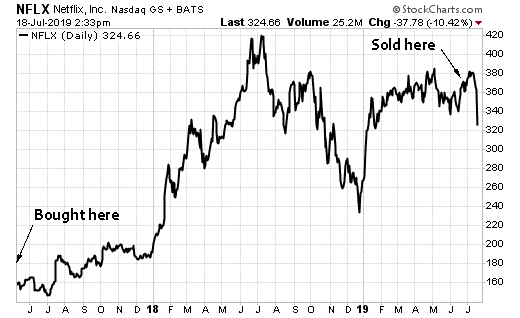Over the past 40 years, our understanding of why people do the things they do has grown by leaps and bounds. That includes the human biases that often torpedo our investment performance.

Why do we hold onto losing stocks when our rationale for buying the stocks is gone?
Why do we sell winning stocks way too quickly?
Why do we resist making smart financial moves when we can easily see how beneficial they will be?
Why do we act so crazy with money?
After much experimentation and research, experts in behavioral finance pinpointed a number of factors — one of which is termed Disposition Effect Bias.
As you probably know, this is our Peak Performance Series at Market360. Each day, I’m detailing the human behaviors that can cost us big money as investors … and how you can neutralize their costly effects.
The human brain is a marvelous tool for creating art, music, language, and engineering feats, but it’s a terrible tool for investing.
The more you know about the workings of your own mind, the “bugs” inside it, and how they work against our investment performance, the more you can develop strategies to mitigate the negative effects of those bugs.
In today’s essay, we’ll talk about the challenge of Disposition Effect Bias, how it works, and how you can neutralize its negative effects.
One of the Worst Tendencies of Investors
There’s an old cliché among investors: “You can’t go broke taking a profit.” Well, that saying has probably killed more portfolios than Attila the Hun did Romans. Investors tend to cash in gains far too soon and hang on to losers far too long — that is the classic Disposition Effect.
I believe in always doing the math … and here’s what it tells us: If you take 5% to 10% profits on your winners but continually take huge losses on your losers (in the belief that the stock will come back and you should hold out for a profit), your overall results will look pretty bleak.
You never want to compound your losses like that. Remember: You can show love to stocks, but stocks can’t love you back. When they become too risky, you simply have to sell them and move on. That’s true when the position is going south — and it’s also true if it’s made you rich.
That’s what we do in Accelerated Profits, where we pick our stocks on strict criteria … but we trade back out of them the moment my proprietary trade signals start to sour on the stock.
I’ll give you an example, because I want to make it clear that – while I’m willing to invest long-term — sometimes it pays to heed the signs and “cash out.”
A Tale of Two Streaming Services
I’m often asked if Netflix (NASDAQ:NFLX) is a good investment. My answer is much the same as for any stock: Timing is everything.
In May 2017, NFLX had been on the market for 15 years. It’d been a bumpy ride, but Netflix had become the leading internet television network globally. Already in mid-2017, more than 125 million hours of content were streamed daily through the Netflix app. At the time when my stock system deemed NFLX a “Buy,” the latest quarterly results had showed 566% earnings growth versus the 2016 quarter … with much more to come.
Now, did we take our profits at the first 10%, 15%, even 50% bump? No. Because we weren’t operating on greed, or fear … we were operating on a specific set of objective metrics. This helped us hold on … even as supposed “Netflix killers” came and went. For a long time, NFLX was simply untouchable.
NFLX had become the longest-held of our Ultimate Growth Trades at Accelerated Profits, and we were rewarded with a 120% profit.
Then things started to change this June. I’d kept running the numbers on Netflix (I run them every day), and I saw that, while the first-quarter numbers were strong, the company’s forward-looking guidance was weaker than expected. In turn, Wall Street analysts had revised their expectations for NFLX lower. The consensus was calling for negative earnings growth.
Some investors might have held on to such a dominant player as Netflix. But we took this as our cue to exit.
By taking profits on NFLX on June 11, we darn near caught the high of the year. Starting in July, rumors of major competition (as well as the falling earnings) caused NFLX to fall 27%!

Apple’s (NASDAQ:AAPL) annual product livestream was a major setback. Its announcement of “Apple TV+” for just $4.99 a month – a direct shot at Netflix, which starts at nearly twice that — took NFLX down even further.
Since then, NFLX has pretty much erased its entire year-to-date gain. And I bet plenty of investors are hanging on … waiting and hoping to regain some profit. Time will tell. But in the meantime, we took our 120% gain in Accelerated Profits. We won’t be back unless and until Netflix meets my objective criteria for stocks to buy now.
We didn’t take NFLX profits too early, and we didn’t hang on when signs started to look bad. We let the numbers make the decision.
Now I’ve got something much more exciting brewing.
Project Mastermind
Besides NFLX, my system also pinpointed other stocks that resulted in gains like 122% … 150% … 109% … 116% … 209% … and even 487%!
The secret to this is simple:
Through hundreds of hours of research, I discovered how an elite type of stock consistently outperformed the broad market, year in and year out. After extensive analysis, I isolated the eight key qualities that these super-performing stocks shared… and I developed a system for riding them.
Last week I hosted a special event where I unveiled Project Mastermind and revealed the stock I’ve rated number one based on insights from Project Mastermind — ticker symbol and all. I’m really excited about the project, and I made sure to record the kickoff for you to review, if you couldn’t make it. Click here to watch now.
Louis Navellier had an unconventional start, as a grad student who accidentally built a market-beating stock system — with returns rivaling even Warren Buffett. In his latest feat, Louis discovered the “Master Key” to profiting from the biggest tech revolution of this (or any) generation. Louis Navellier may hold some of the aforementioned securities in one or more of his newsletters.
